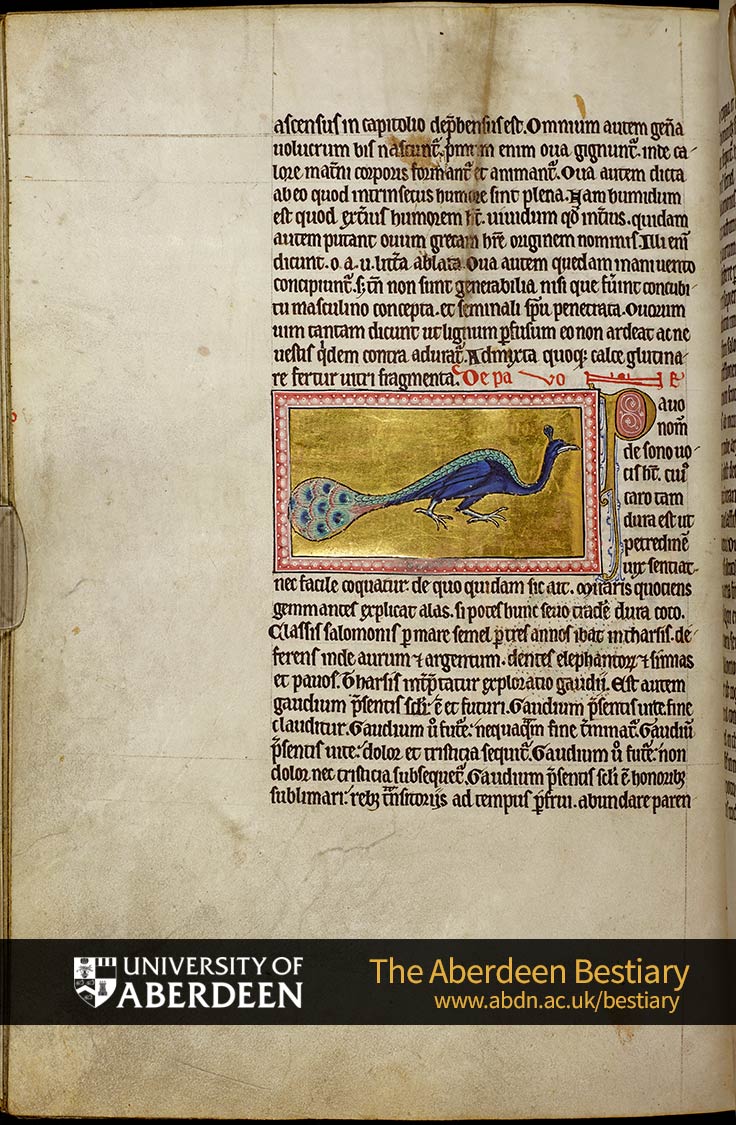Folio 59v - the duck, continued. De pavone; Of the peacock
were detected when they ascended the Capitol.
Each species of bird is born twice; for first the eggs are produced, then they are given form and life by the warmth of the mother's body. They are called eggs, ova, because inside they are full of fluid. Anything that has fluid on the outside is umidum, 'wet'; anything with fluid on the inside is called vividum, 'life containing'.
Some people think that the word ovum is of Greek origin. For the Greeks call eggs oa, losing the v.
Some eggs are conceived by useless wind; nothing can be hatched from them, however, unless they have been conceived through intercourse with a male bird and penetrated by the spirit carried in his seed.
Such is the quality of eggs, they say, that wood soaked in them will not burn, nor clothing, in turn, catch fire. In addition, eggs mixed with chalk, it is said, will glue pieces of glass together.
Of the peacock
The peacock gets its name, pavo, from the sound of its cry. Its flesh is so hard that it hardly decays and it cannot easily be cooked. A certain poet said of it: 'You are lost in admiration, whenever it spreads its jewelled wings; can you consign it, hard-hearted woman, to the unfeeling cook?' (Martial, Epigrams, xiii, 70)
'Solomon's fleet went to Tharsis once every three years and brought from there gold and silver, elephants' teeth and apes, and peacocks' (see 2 Chronicles, 10: 21).
Tharsis we take to mean the search for joy. There is the joy of this world and the joy of the world to come. The joy of this life is limited. But the joy of the life to come is wholly unlimited. Pain and sadness each follow the joy of this life. But neither pain nor sadness follows the life to come. Joy in this world consists of being elevated by honours, enjoying to the full and for the moment things which are transitory, enjoying a wide circle of relations
- Commentary
-
Commentary
Text
The peacock.
Illustration
A fine portrait including the peacock's tail.
Comment
The text says the bird is very hard to cook. In fact the peacock was a great aristocratic delicacy but perhaps it was not often eaten by the clergy involved with producing the text. The illustration is pricked all around for pouncing. Prick marks from the duck illustration on f.59r are visible. Initial indicator 'p' on left margin, in red. The frame overlaps the initial, type 2.
Folio Attributes
- Transcription and Translation
-
Transcription
ascensus in capitolio deprehensus est . Omnium autem genera\ volucrum bis nascuntur, primum enim ova gignuntur, inde ca\ lore materni corporis formantur et animantur. Ova autem dicta\ ab eo quod intrinsecus humore sint plena. Nam humidum\ est quod exterius humorem habet, vividum quod interius, quidam\ autem putant ovum Grecam habere originem nominis. Illi enim\ dicunt oa v littera ablata. Ova autem quedam inani vento\ concipiuntur, sed tamen non sunt generabilia nisi que fuerint concubi\ tu masculino concepta, et seminali spiritu penetrata. Ovorum\ vim tantam dicunt ut lignum perfusum eo non ardeat ac ne\ vestis quidem contra aduratur. Admixta quoque calce glutina\ re fertur vitri fragmenta. \ De pavone \ Pavo\ nomen\ de sono vo\ cis habet, cuius\ caro tam\ dura est ut\ petredinem [putredinem]\ vix sentiat\ nec facile coquatur, de quo quidam sic ait: Miraris quociens\ gemmantes explicat alas, si potes hunc sevo tradere dura coco.\ Classis Salomonis per mare semel per tres annos ibat in Tharsis, de\ ferens inde aurum et argentum, dentes elephantorum et simias\ et pavos. Tharsis interpretatur exploratio gaudii. Est autem\ gaudium presentis seculi et futuri. Gaudium presentis vite, fine\ clauditur. Gaudium vero future, nequaquam fine terminatur. Gaudium\ presentis vite, dolor et tristicia sequitur. Gaudium vero future, non\ dolor nec tristicia subsequetur. Gaudium presentis seculi est honoribus\ sublimari, rebus transitoriis ad tempus perfrui, abundare parenTranslation
were detected when they ascended the Capitol. Each species of bird is born twice; for first the eggs are produced, then they are given form and life by the warmth of the mother's body. They are called eggs, ova, because inside they are full of fluid. Anything that has fluid on the outside is umidum, 'wet'; anything with fluid on the inside is called vividum, 'life containing'. Some people think that the word ovum is of Greek origin. For the Greeks call eggs oa, losing the v. Some eggs are conceived by useless wind; nothing can be hatched from them, however, unless they have been conceived through intercourse with a male bird and penetrated by the spirit carried in his seed. Such is the quality of eggs, they say, that wood soaked in them will not burn, nor clothing, in turn, catch fire. In addition, eggs mixed with chalk, it is said, will glue pieces of glass together. Of the peacock The peacock gets its name, pavo, from the sound of its cry. Its flesh is so hard that it hardly decays and it cannot easily be cooked. A certain poet said of it: 'You are lost in admiration, whenever it spreads its jewelled wings; can you consign it, hard-hearted woman, to the unfeeling cook?' (Martial, Epigrams, xiii, 70) 'Solomon's fleet went to Tharsis once every three years and brought from there gold and silver, elephants' teeth and apes, and peacocks' (see 2 Chronicles, 10: 21). Tharsis we take to mean the search for joy. There is the joy of this world and the joy of the world to come. The joy of this life is limited. But the joy of the life to come is wholly unlimited. Pain and sadness each follow the joy of this life. But neither pain nor sadness follows the life to come. Joy in this world consists of being elevated by honours, enjoying to the full and for the moment things which are transitory, enjoying a wide circle of relations

